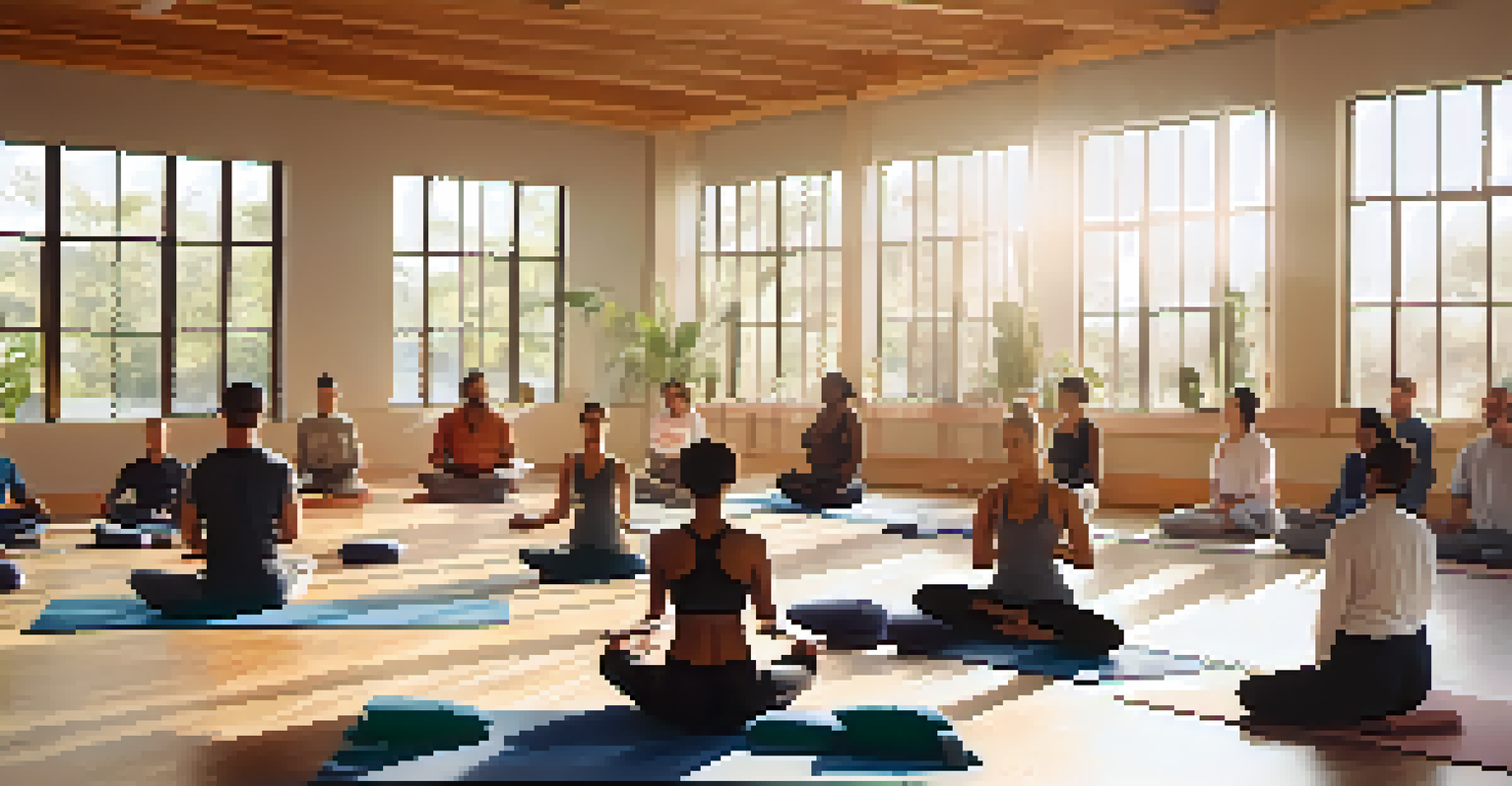The Connection Between Physical Fitness and Performance Anxiety

Understanding Performance Anxiety and Its Impact
Performance anxiety is a common experience that affects many individuals, whether in sports, public speaking, or even daily tasks. It's that nagging feeling of fear and self-doubt that can create a mental block, preventing you from showcasing your true abilities. This anxiety can lead to physical symptoms like racing hearts, sweaty palms, and shaky hands, which only amplify the stress of the situation.
Your body hears everything your mind says.
The impact of performance anxiety can be profound, often leading to missed opportunities or subpar performances. Athletes might choke during critical moments, while professionals could struggle to deliver presentations effectively. Understanding this psychological hurdle is essential for anyone looking to improve their performance in high-pressure scenarios.
Addressing performance anxiety often requires a multi-faceted approach, including techniques like deep breathing, visualization, and positive affirmations. However, one of the most effective strategies might just be boosting your physical fitness, which can lead to a more confident and calm mindset.
The Role of Physical Fitness in Mental Well-Being
Physical fitness is not just about building muscle or losing weight; it significantly contributes to mental well-being. Regular exercise releases endorphins, often referred to as 'feel-good' hormones, which can elevate your mood and reduce feelings of anxiety. This chemical boost can help create a mental environment that is less susceptible to the grips of performance anxiety.

Moreover, engaging in physical activities can improve self-esteem. When you commit to a fitness routine and see progress, it fosters a sense of accomplishment. This newfound self-confidence can transfer into various areas of life, including situations where performance anxiety might rear its head.
Performance Anxiety Affects Many
Performance anxiety is a common issue that can hinder individuals from displaying their true abilities in various high-pressure situations.
Additionally, physical fitness can enhance focus and cognitive function. A healthy body supports a healthy mind, allowing you to concentrate better and manage stress more effectively, which is vital when facing performance-related challenges.
How Exercise Can Help Manage Stress Levels
Exercise is a proven stress reliever, and understanding how it works can illuminate its benefits in managing performance anxiety. When you engage in physical activity, your body reduces levels of the stress hormone cortisol, which can help you feel more relaxed and in control. This physiological response is crucial for those who face pressure in performance situations.
It is not the mountain we conquer, but ourselves.
Moreover, the rhythmic nature of many exercises, such as running or swimming, can have a meditative effect. This meditative quality allows your mind to shift focus away from anxiety-inducing thoughts, creating a mental space where you can mentally prepare for your performance. It's akin to hitting a reset button for your brain.
Incorporating regular exercise into your routine not only builds resilience against stress but also helps you develop a healthier perspective on challenges. Over time, this can lead to a more composed approach when faced with performance-related anxiety.
Building a Routine: Key Types of Exercises
Creating a fitness routine that targets both physical and mental health can be a game-changer for managing performance anxiety. Cardio workouts, such as running, cycling, or dancing, are excellent for boosting heart health and releasing endorphins. These activities can help clear your mind and elevate your mood, making you feel more prepared for performance situations.
Strength training is another essential component of a well-rounded fitness routine. Lifting weights not only builds physical strength but also enhances discipline and focus. This focus can translate into other areas of life, helping you to channel your energy positively when facing anxious moments.
Fitness Boosts Mental Well-Being
Regular physical exercise releases endorphins and enhances self-esteem, significantly contributing to improved mental health and reduced anxiety.
Finally, incorporating flexibility exercises, such as yoga or Pilates, can significantly impact your mental state. These practices promote relaxation and mindfulness, teaching you how to remain calm and centered in the face of stress. Together, these exercise types create a powerful toolkit for combating performance anxiety.
The Mind-Body Connection: How They Influence Each Other
The mind-body connection is a fascinating aspect of our overall health and well-being. What happens in your mind can manifest physically, and vice versa. When you're anxious about performing, your body may react with tension, which can further exacerbate feelings of anxiety, creating a vicious cycle.
Conversely, engaging in physical fitness can help break this cycle. When you work out, you’re not just improving your physical health; you’re also sending signals to your brain that promote relaxation and reduce anxiety. This interplay can create a positive feedback loop, where improved physical fitness leads to better mental health, reinforcing the notion that both are intertwined.
Recognizing this connection can empower individuals to take control of their anxiety. By focusing on improving physical fitness, you can create a more resilient mindset that is less prone to the pitfalls of performance anxiety.
Strategies for Incorporating Fitness into Daily Life
Incorporating fitness into your daily routine doesn't have to be daunting; small changes can make a big difference. Start by finding activities you enjoy, whether it's walking, dancing, or playing a sport. Enjoying your workout makes it easier to stick with it, turning exercise into a fun part of your day rather than a chore.
Setting realistic goals is also crucial. Instead of overwhelming yourself with lofty expectations, aim for manageable milestones. For example, commit to exercising for just 20 minutes a day or trying a new activity each week. Achieving these smaller goals can provide a sense of accomplishment that builds confidence over time.
Routine Exercise Eases Anxiety
Incorporating fitness into daily life not only helps manage stress but also fosters a resilient mindset that can combat performance-related anxiety.
Lastly, consider scheduling your workouts like any other important appointment. Consistency is key in establishing a routine. By prioritizing fitness in your daily life, you’ll not only improve your physical health but also arm yourself with the tools to combat performance anxiety.
The Long-Term Benefits of Fitness on Anxiety Levels
The long-term benefits of regular physical fitness extend far beyond improved physical health; they also encompass lasting reductions in anxiety levels. Studies consistently show that individuals who maintain an active lifestyle experience lower rates of anxiety and stress-related disorders. This proactive approach creates a buffer against the pressures of life and performance.
Moreover, as you continue to engage in fitness, you may notice a shift in your overall mindset. With time, the confidence gained through regular exercise can lead to a more resilient approach to challenges, including performance situations. You may find that you can tackle anxiety-inducing tasks with a newfound sense of calm and control.

Ultimately, the commitment to physical fitness fosters a healthier relationship with stress and performance anxiety. Embracing this journey can transform not only your physical health but also empower you to face life’s challenges with confidence and ease.